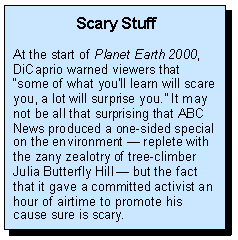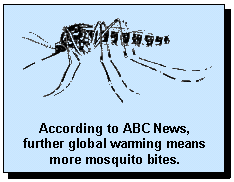 |
||||||||||||||||||||||||
|
||||||||||||||||||||||||
 |
||||||
|
||||||
 |
||||||||||||||||||
|
||||||||||||||||||
 |
|||||||||
|
 |
||||||||||||||||||||||||
|
||||||||||||||||||||||||
 |
||||||||||||||||||||||||
|
||||||||||||||||||||||||
|
What The Media Tell
Americans About Free Enterprise 
ABC News Sends Leonardo DiCaprio to High School Despite all of the controversy that preceded it, Planet Earth 2000 ó the ABC News special that dispatched actor-turned-activist Leonardo DiCaprio to interview President Clinton ó was a ratings flop. When it aired on Saturday, April 22, more Americans instead chose to watch repeats of Early Edition on CBS, The Pretender on NBC or Cops on Fox. And while Planet Earth tried to win teenaged viewers by featuring poster-boy DiCaprio, a techno soundtrack and an overdose of MTV-esque camera techniques, only a minuscule 168,000 teens tuned in.
Recalling that some broadcasters actually claimed a few years ago that The Jetsons ó a cartoon about a space-age family with a talking dog and a robotic maid named Rosie ó was educational, the classroom merits of Planet Earth are still debatable. Given the slim audience and the fact that most of the media buzz concerned the DiCaprio-Clinton exchange that accounted for barely two minutes at the end of the show, MediaNomics offers this summary of the program as a public service. First, the show was preposterously one-sided. During the entire hour, which linked SUV-caused global warming with everything from mosquito bites to dead Alaskans, only 41 seconds were given to the view that any climate change that might occur isnít necessarily catastrophic. "It may very well be that as we go into the 21st century," commented the University of Virginia climatologist Patrick Michaels, "what we are going to see is the paradigm of fragile Earth evolves into the paradigm of resilient Earth. In other words, you know, it takes a licking and keeps on ticking." Michaels point of view was buried, however, amid a litany of the dire consequences ABC attributed to climate change, and a sympathetic profile of an environmental activist who lived in a tree for two years. After the opening montage, in which DiCaprio said he became interested in the environment after frogs vanished from a section of the Los Angeles river near where he grew up, his co-host, ABC reporter Elizabeth Vargas, warned that "Yes, the Earth is getting warmer, about one degree Fahrenheit over the last century. It may sound insignificant, but you should know the rate is increasing, and over the last 10 years, we've had five of the warmest winters on record. And those warm, wet winters means mosquitoes don't die out. In fact, they breed in standing rainwater, so this summer, look for more bug bites, more insecticide spraying and more outbreaks of rare tropical diseases."
Later, ABCís Chris Cuomo reported from the Arctic Circle, where he claimed "there is no question that Alaska is thawing.... Glaciers, permafrost and sea ice are all melting." Now, that might seem like a good thing, but thereís apparently a dark side to temperate weather: an Alaska state trooper told Cuomo that "last year we had more fatalities, more people going through the ice, than we had in previous years." How many? Cuomo never said, but he did interview Jimmy Brown. "Last year, Jimmy Brown lost his father, along with another hunter, victims, perhaps, of unexpected thawing ice," Cuomo reported. "They took off on a hunting trip to hunt seal," Brown told Cuomo, "and just literally never came back. Some of the conclusions are that the ice apparently must have gotten thinner from beneath the surface." Cuomo then asked Brown, the grieving son, "Do you think itís just coincidence, or do you think weíre talking about the impact of global warming?" "I think weíre talking about more than coincidence," Brown responded, "because itís actually changed the pattern of, you know, how people relate to their hunting cycles and things like that." So, teenagers will learn, global warming kills Alaskan hunters. Perhaps. After an astrophysicist informed Cuomo that life exists on Earth because we arenít too close to the Sun, like Venus, or too far away, like Mars (is global warming supposed to move the whole planet closer to the Sun?), Vargas reported on the bleaching of coral reefs, which can be caused by bacteria, sunlight or the warming of ocean water. According to Vargas, "just last month, government scientists said temperatures had been rising for 40 years in oceans all over the world, but nothing was worse than the year of El Nino." This would be a good way for students to learn about "tautologies," or redundant concepts. (The dictionaryís example is "necessary essentials," but my favorite is "dangerous hazards.") "El Nino" is the nickname given to a large area of warmer-than-usual water in the Pacific Ocean, which can affect the weather, and itís a phenomenon that is independent of global warming. So all Vargas really said was that ocean temperatures were warmest during the year of warm ocean temperatures. (That was 1998, if youíre interested.) Cuomo then detailed Atlantaís efforts to cut back on air pollution. He told viewers "Atlanta has the biggest traffic problem in the nation," but he really meant that Atlantans on average drive more miles each day (35) than residents of other major cities. He didnít tell viewers that Los Angeles is the city with the worst traffic congestion, followed by Washington, D.C., San Francisco, Chicago and Seattle. Most people would probably agree that itís worse to be stuck idling in heavy traffic than to travel farther with relatively fewer delays. Cuomo then had a van compete with an electronically-powered bicycle (an "e-bike") in a five-mile race through rush-hour traffic. The e-bike, which has a top speed of 15 miles per hour, won the race by five minutes. A scientist tested the van and said it had pumped "about eight pounds of carbon dioxide into the atmosphere" during the trip, while the e-bike had produced "next to nothing in emissions." The implication was that the e-bike is both faster and cleaner than a van, but neither Cuomo nor the scientist discussed what commuters should do on rainy days. Cuomo also reported on Ford Motorís campaign to make both its factories and new automobiles more environmentally sensitive by using fuel-efficient technology. Cuomo blamed consumers for driving SUVs. "Bottom line," he told viewers, "businesses will make whatever consumers buy. If we want more environmentally sound cars to replace the gas guzzling SUVs, weíve got to do one thing: actually buy them." One of those environmentally sensitive hybrid gasoline and electric cars, the Toyota Prius, will be available in the U.S. later this year and it got a nice plug on a recent Earth Day episode of CBSís Family Law, as my colleague Brent Baker reported in a recent CyberAlert. But even at an expected $20,500 per car, Toyota loses money, so itís making very few of them. After blaming consumers, Cuomo reported the story of Julia Butterfly Hill, who gained notoriety for living in a California redwood tree for more than two years to keep it from being harvested by a lumber company. The barefoot Hill was shown in her tree, talking on her cellular phone, explaining "Iíve come to become one with nature." The relationship of Hillís story with global warming? Cuomo explained that "even here in New York, trees act as air filters by taking carbon dioxide out and putting oxygen back in." So trees are good. But any tree ó really, any green plant ó will oxygenate the atmosphere and Hill wanted to save one particular redwood tree that somehow acquired the name "Luna." But Cuomo seemed infatuated with Hill ("Now, Julia travels around the country... telling her story of personal power and responsibility"), who "won" her battle when the lumber company was paid $50,000 in exchange for a promise to not cut down "Luna" or any of the trees within 200 feet of "her" (Cuomoís word). Finally, it was time for DiCaprioís conversation with the President. Clinton showed DiCaprio how the White House had saved $100,000 in its electric bills by changing the type of light bulbs that are used, to which DiCaprio exclaimed "Wow." Omitted from the interview (but included in the full transcript of the interview which the White House released, was this question from the Titanic star: "Now, Louisiana is the second largest consumer of fossil fuels and the city most at risk for sea level rise. Canít something be done like in Atlanta where the government withheld highway funds, making it the model city for environmental responsibility?" DiCaprio should thank ABC for removing this portion of the interview, since he doesnít look like a dunce for twice referring to Louisiana as a city (Clinton eventually realized that he meant New Orleans). At least students across America wonít be misinformed about geography, just science. DiCaprio closed the program with a personal plea. "Thereís a concept in the scientific community that goes something like this," he said. "Complex systems or large phenomena like El Nino can be started by a fluctuation as gentle as the flapping wings of a butterfly. Itís a metaphor called the butterfly effect. Now, if we take that a step further, that means that the slightest action could have a negative effect on the planet or in turn, it might result in something positive. Simple fact is thereís nothing to lose if we take preventative measures right now to save our planet, but thereís a whole lot to lose if we donít." Now, thatís an activist appeal that fits with DiCaprioís position as chairman of Earth Day 2000, but itís hardly reflective of the objectivity still claimed by news organizations such as ABC. At the start of Planet Earth 2000, DiCaprio warned viewers that "some of what youíll learn will scare you, a lot will surprise you." It may not be all that surprising that ABC News produced a one-sided special on the environment ó replete with the zany zealotry of tree-climber Julia Butterfly Hill ó but the fact that it gave a committed activist an hour of airtime to promote his cause, and then distributed it to the nationís schools as educational material, sure is scary.
Home | News Division
| Bozell Columns | CyberAlerts |
||||




 No
matter. Since most kids wouldnít watch it on their own, ABC made it
available to teachers via Channel One, a classroom news service, on
May 1. According to the New York Times, 12,000 high school
and middle schools would receive the program.
No
matter. Since most kids wouldnít watch it on their own, ABC made it
available to teachers via Channel One, a classroom news service, on
May 1. According to the New York Times, 12,000 high school
and middle schools would receive the program. So
students would find out that bug repellant stock prices will soar in
the 21st century ó especially since thereíll be fewer frogs to eat
the bugs.
So
students would find out that bug repellant stock prices will soar in
the 21st century ó especially since thereíll be fewer frogs to eat
the bugs.